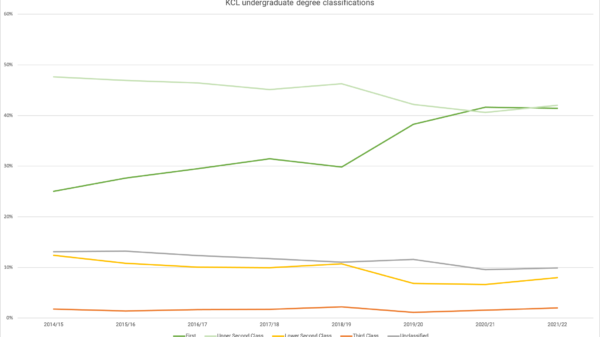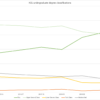Staff writer Leah Napier-Raikes examines the inequality of Russell Group University admissions between international and domestic students, arguing this runs contrary to the goal of social mobility.
In 2023, a staggering one third of UK universities saw a significant drop in overseas non-EU applicants, nearly double the decline observed in 2022. This decline may be, in part, attributed to international students’ reaction to the hostile rhetoric of Prime Minister Rishi Sunak’s government.
With the aim of curbing rising net immigration, in 2023 the government removed the ability for international students to switch their students visas to work visas before their studies have been completed. Driven by the Home Office’s concern that education was being exploited as a “backdoor route to work in the UK”, this change has further dissuaded overseas students from pursuing educational opportunities in the UK.
However, due to this sharp decline, many UK universities now face significant financial problems – a quarter of universities are currently making a loss. The cumulative loss across the entire sector currently sits at £2 billion – a huge increase from the £200 million of just a year before. UK higher education institutions have a clear reliance on the funding from international students.
In the case of KCL, a recent report from the Policy Institute highlights a concerning trend regarding efforts to decrease UK universities’ reliance on China. The report reveals that several leading institutions, including King’s, are still heavily dependent on Chinese students for both tuition fee revenue and enrolment in postgraduate research programs, especially in fields like economics, science and technology, with Chinese students occupying over a quarter of international PhD slots. A sudden interruption of student exchanges and collaboration due to escalating geopolitical tensions would significantly harm the UK’s knowledge economy.
Unequal Playing Field
The Russell Group has stated that they make a loss of approximately £2,500 per home student, whose annual tuition fees have been essentially frozen at £9,250 since 2012, despite inflation. This is a real terms fall of approximately £2,529 (27.3%) according to the Bank of England’s inflation calculator.
When contrasted with their international peers, who have fees averaging at an estimated £22,200 per year, it comes as little surprise that universities are enrolling 40 per cent more overseas students than five years ago, favouring applicants from China and India according to The Times. In 2022, Vice-Chancellors of universities have stated that the inadequate income from domestic tuition fees has incentivised the targeting of overseas students, as they pay more than twice as much for the same courses. This has placed home students at a substantial disadvantage in the admissions process.
To combat these financial strains, universities are resorting to lowering the bar of entry for foreign students. The University of York has recently reduced their entry requirements for international students to the equivalent of B/B/C grades at A-Level into its undergraduate programmes, despite the ‘typical offer’ being A/A/A for home students. However, efforts to attract foreign students by lowering entry requirements have not come without criticism.
The ‘Back Door’ to Top Universities
15 members of the Russell Group have recently come under fire for offering ‘foundation years’ of competitive courses to overseas students with significantly lower entry requirements than that of home students, allowing foreign students to essentially ‘buy their way’ onto competitive degree courses. Many international students admitted onto these courses have their highest level of qualification being equivalent to C grades at GCSE, while British students are required to have achieved A or A* grades at A-level as a minimum.
This has been termed the “back door” route of recruiting overseas students. At the same time, 2022 saw the largest rejection rate of domestic applicants to Russell Group universities yet recorded, with four out of ten UK candidates turned away – this constitutes a clear unequal playing field in the admissions process for the country’s top universities.
Degree results also show that students from outside the EU have been performing lower than British students, being more than twice as likely to receive a lower second or third-class degree. The purpose of entry requirements for degrees is to assess if a candidate would perform well and be able to educationally benefit from the course. By lowering these standards universities are harming those who are under-qualified to be placed onto competitive programmes and leaving themselves with lower classifications of degree.
A Growing Problem
As universities are privatised, it is inevitable and unavoidable that some decisions they make will be fiscally centred. However, we are now seeing an enormous disparity in the requirements for competitive programmes between home students and their more financially able international counter-parts. This prompts many questions surrounding the lack of meritocracy in the institutions which are designed to aid with social mobility and not to inhibit it.
It may appear that the only solution for the deficits faced by UK universities without creating an unequal admissions process would be to raise home students’ tuition fees to match international students. However, these issues have arisen amidst the infamous ‘cost-of-living crisis’. If domestic fees are shot up to the same prices as international students, this will only exacerbate the elitism within Russell Group universities, deterring working class candidates and hindering higher education as a tool for social mobility. The situation appears to be a lose-lose.
It’s therefore apparent that government intervention is necessary to keep the sector afloat and the dream of ‘moving on up’ alive. But with the incumbent government seemingly determined to make this “another party’s problem”, a quick resolution for this issue seems improbable. We can only hope that a change of a policy – and an increase in subsidisation – is on the way.


















